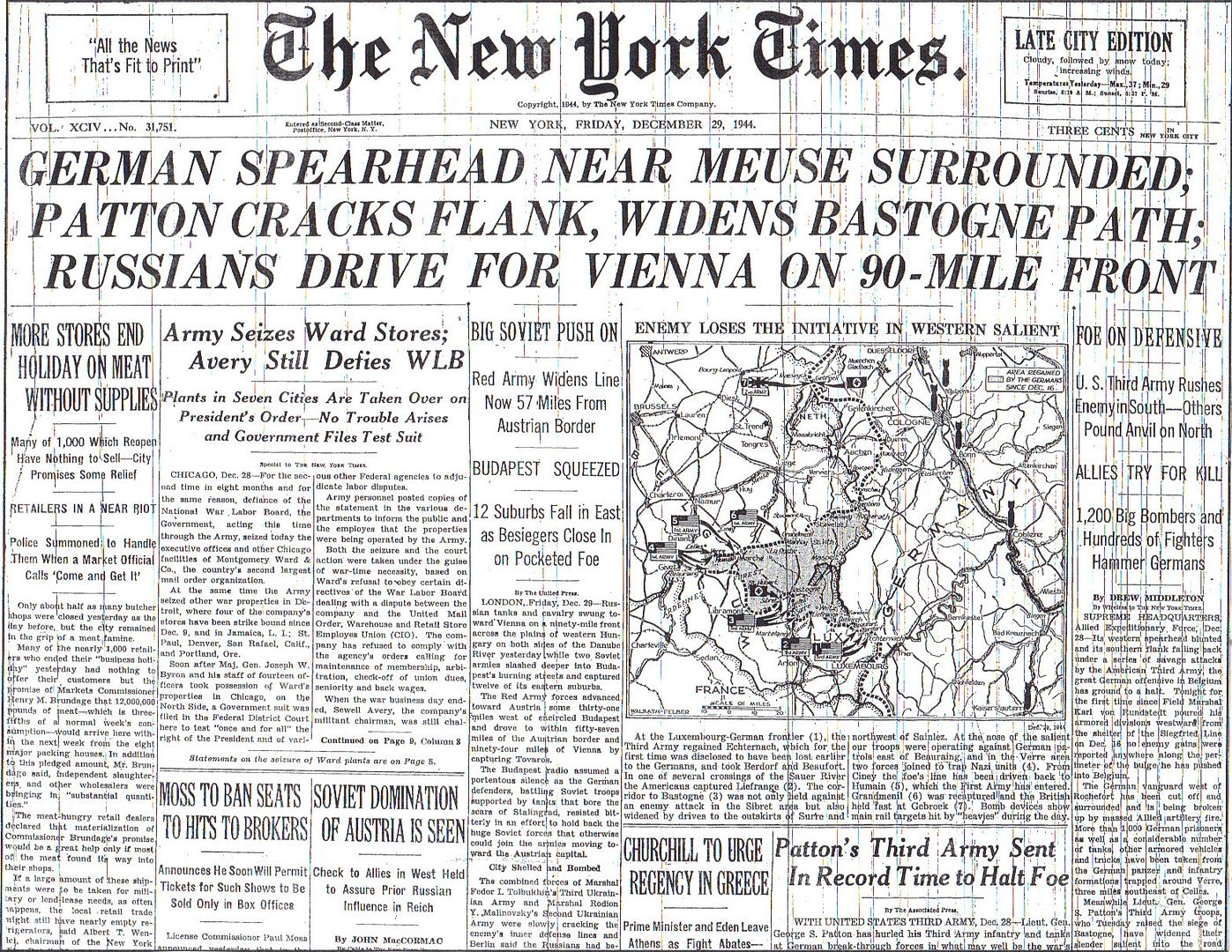
Posted on 12/29/2014 4:41:16 AM PST by Homer_J_Simpson

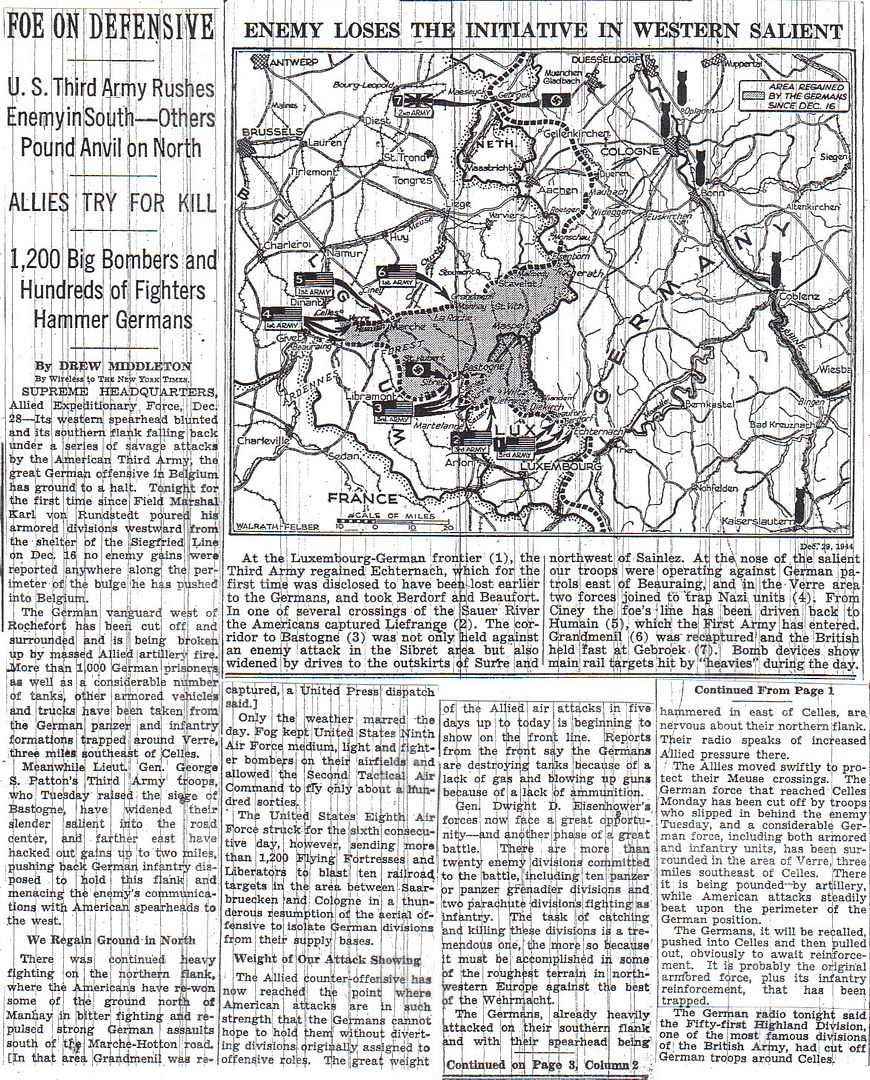
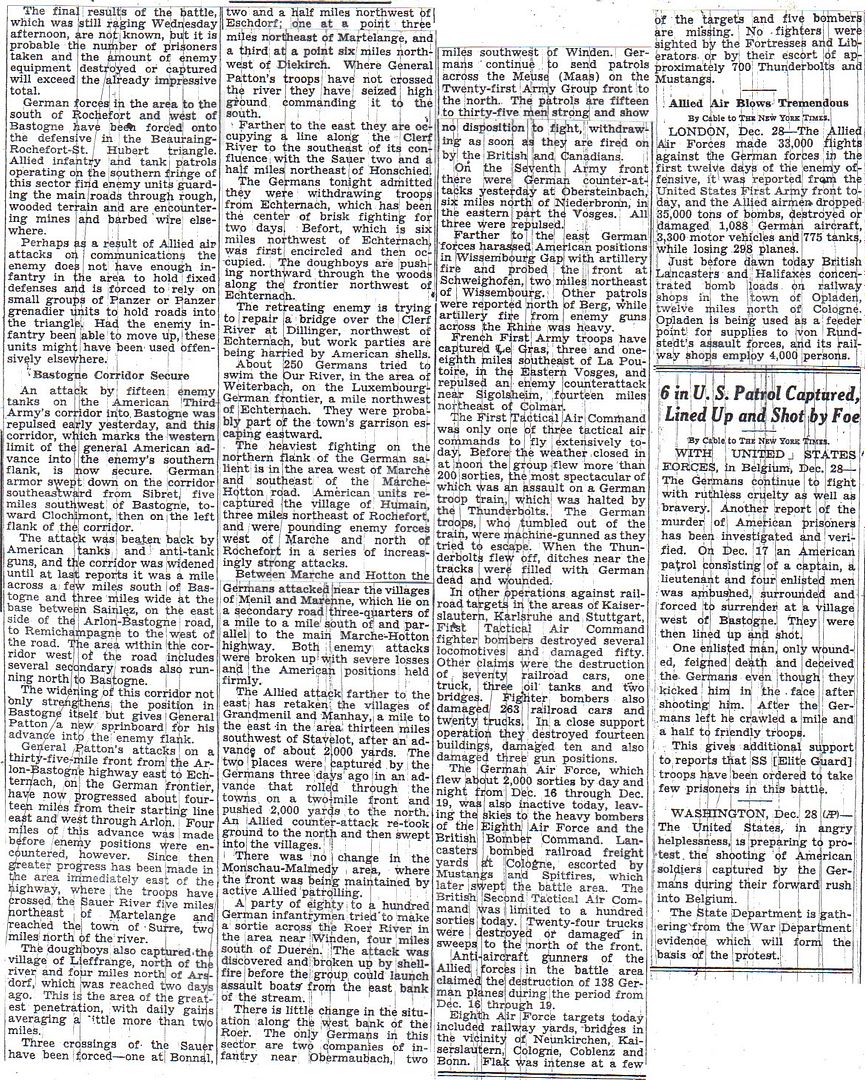
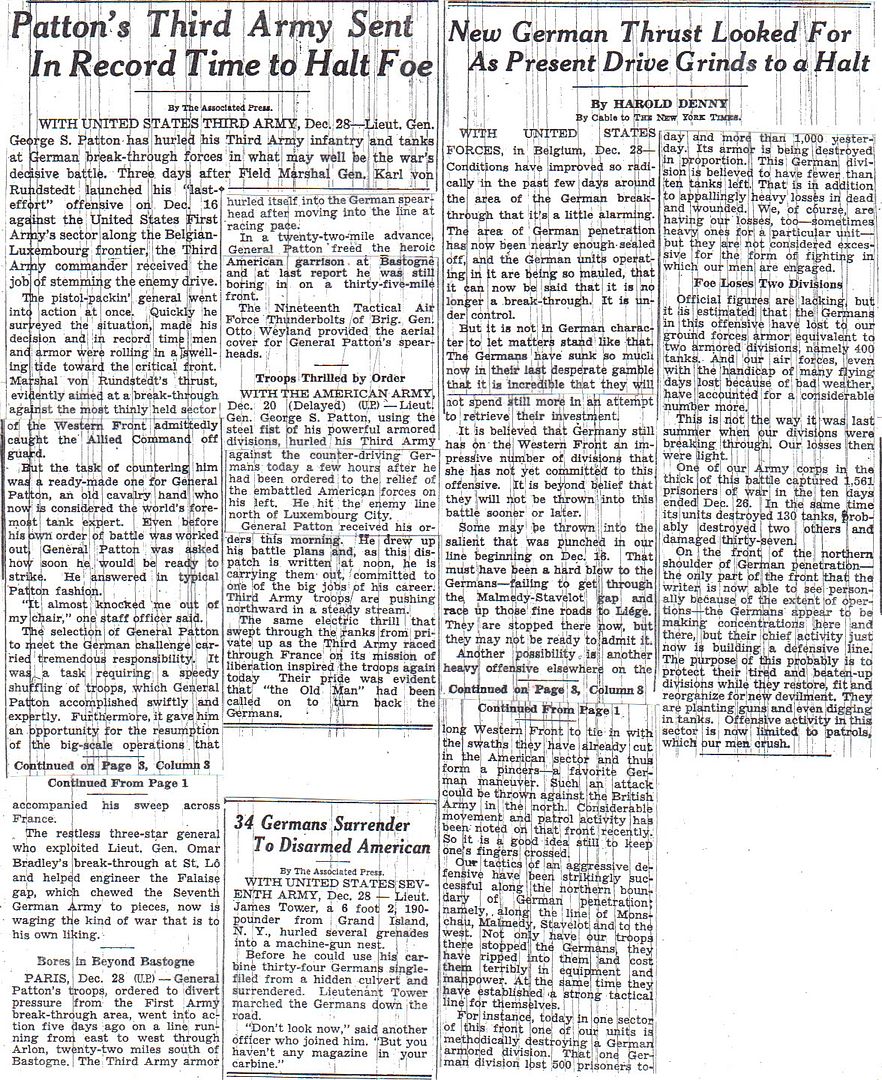
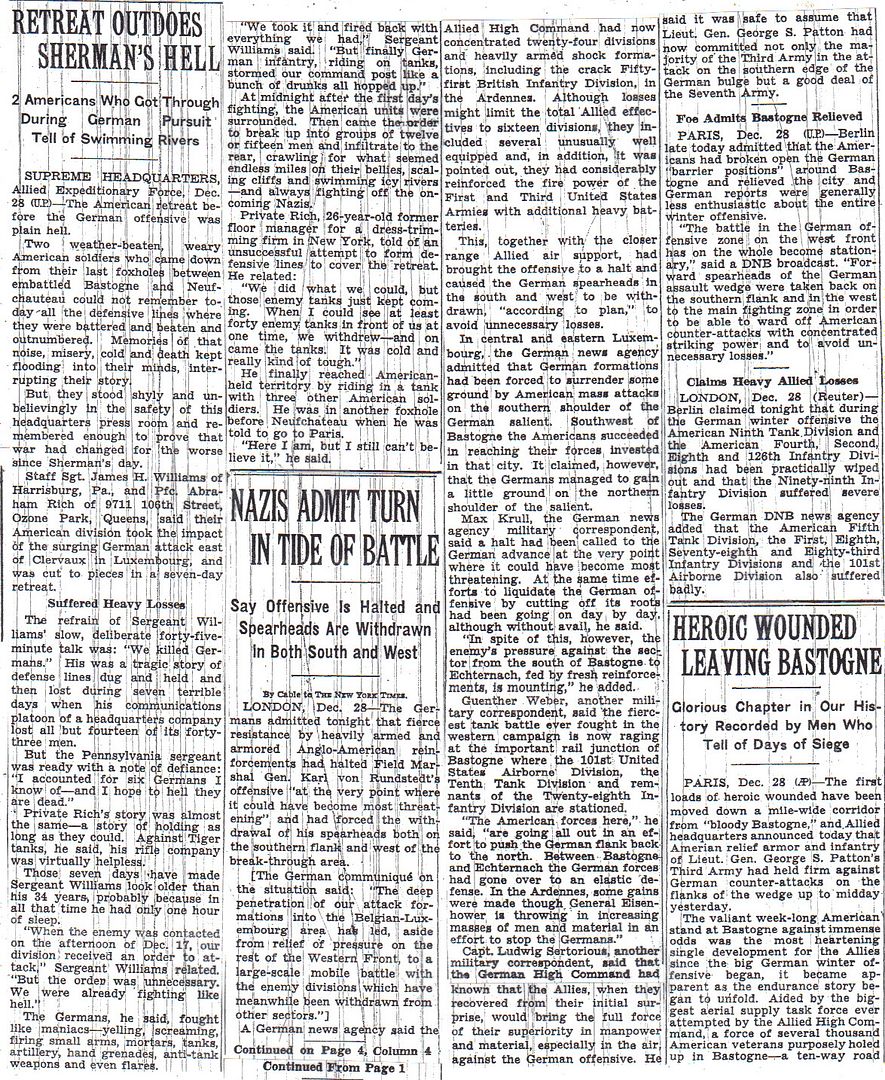
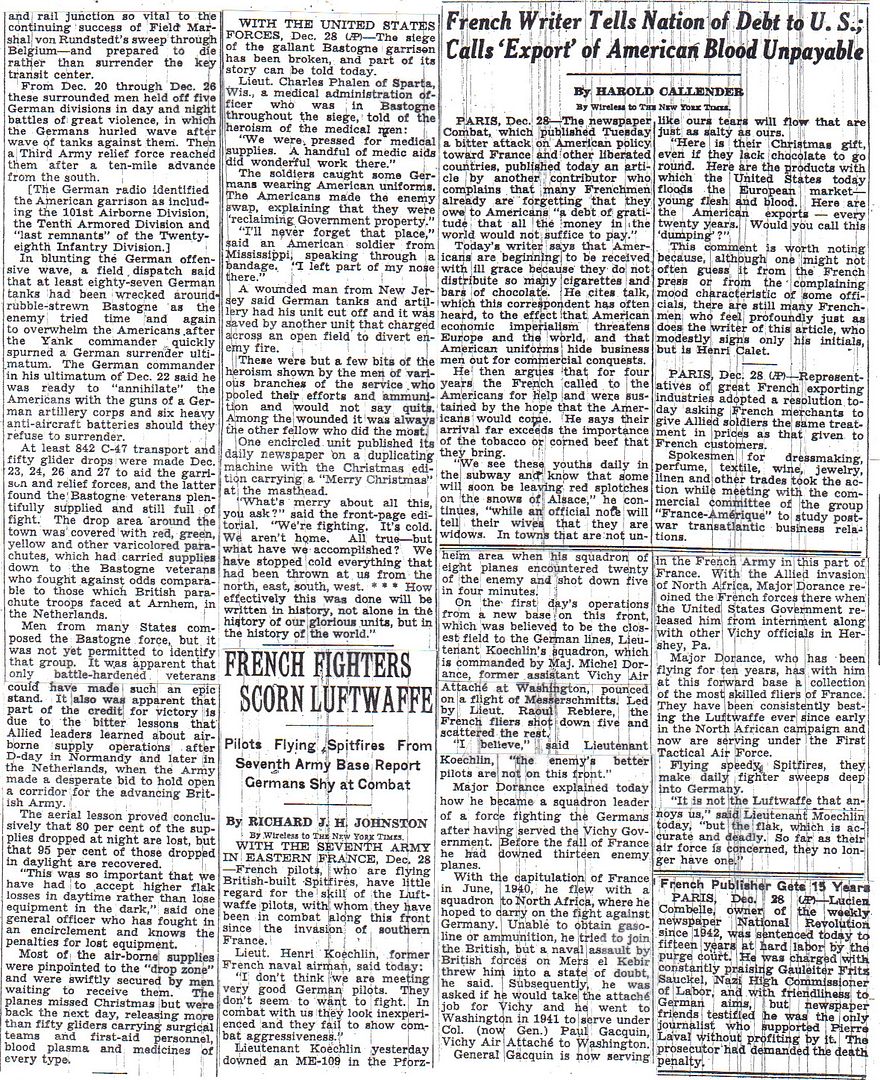
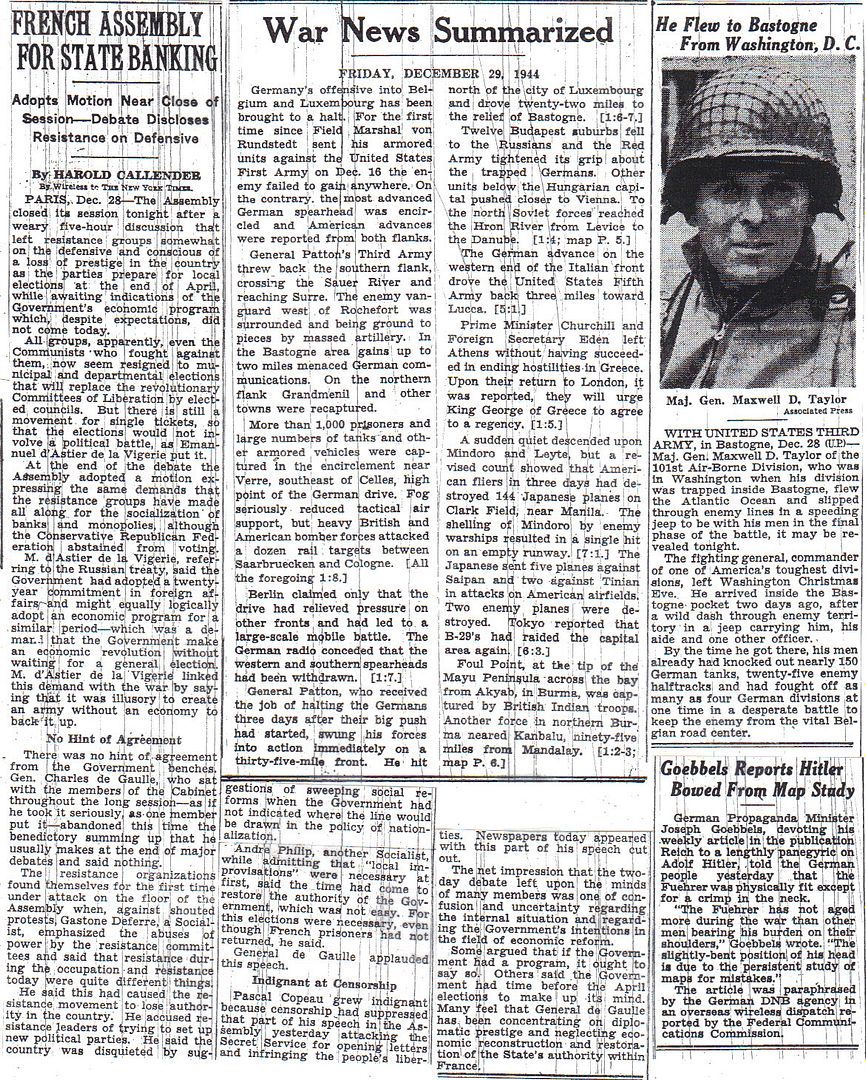
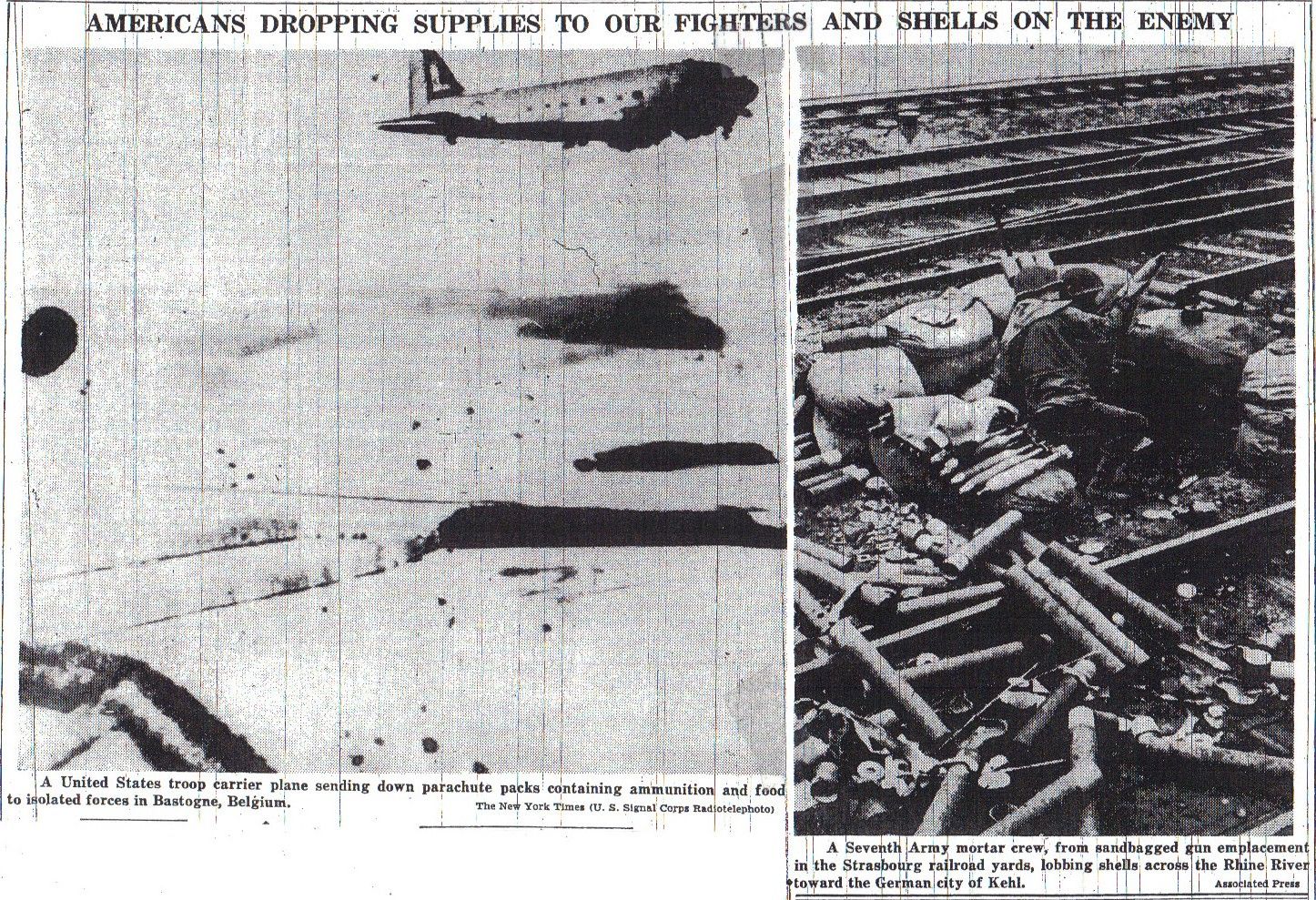
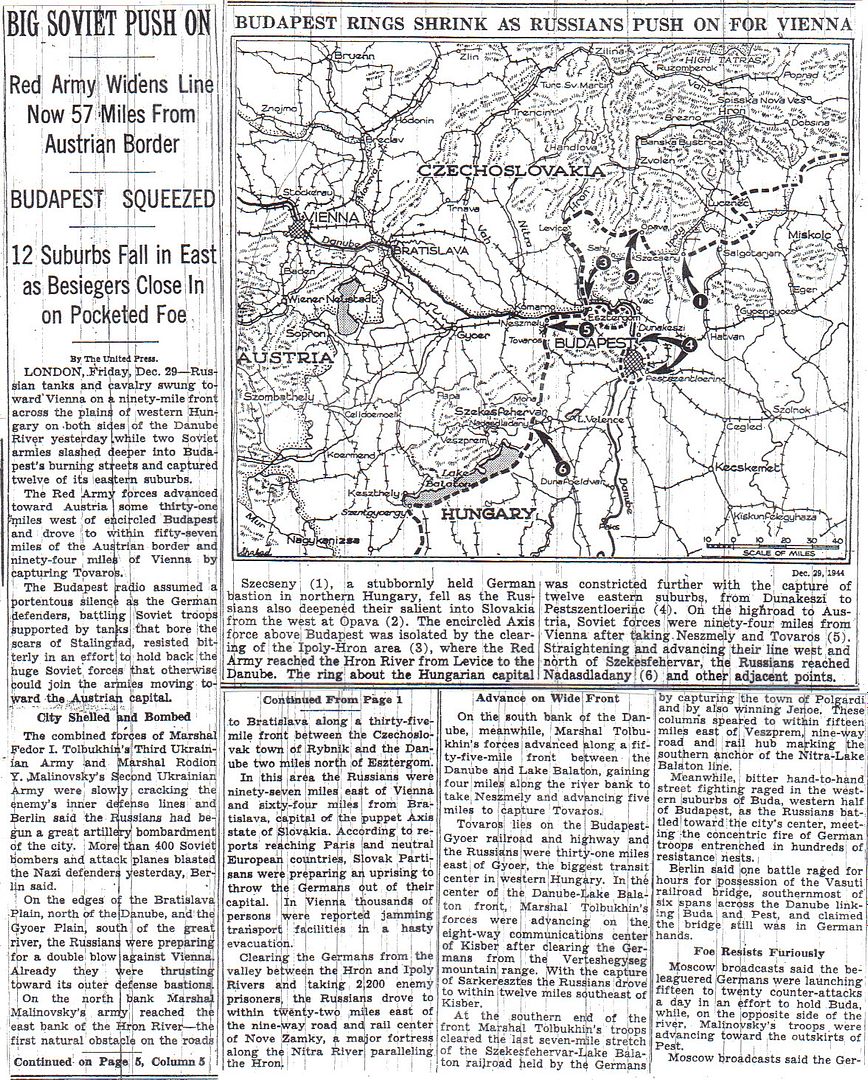
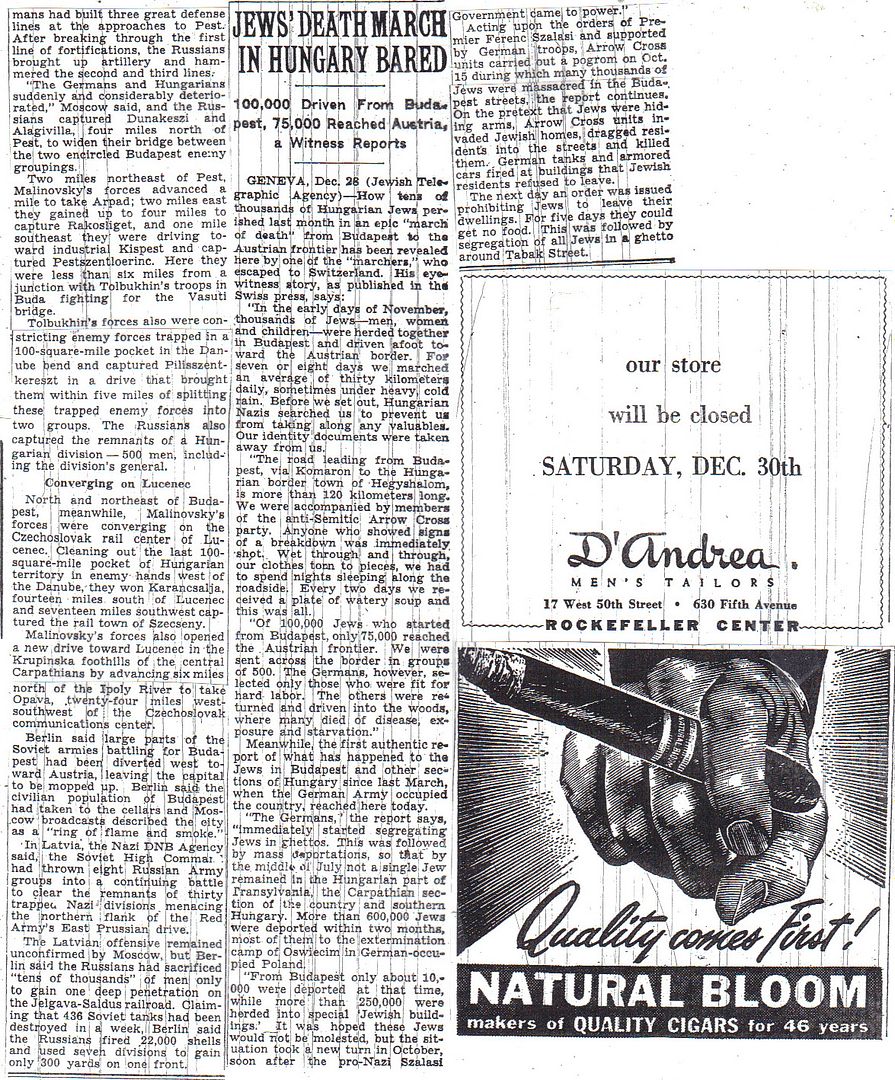
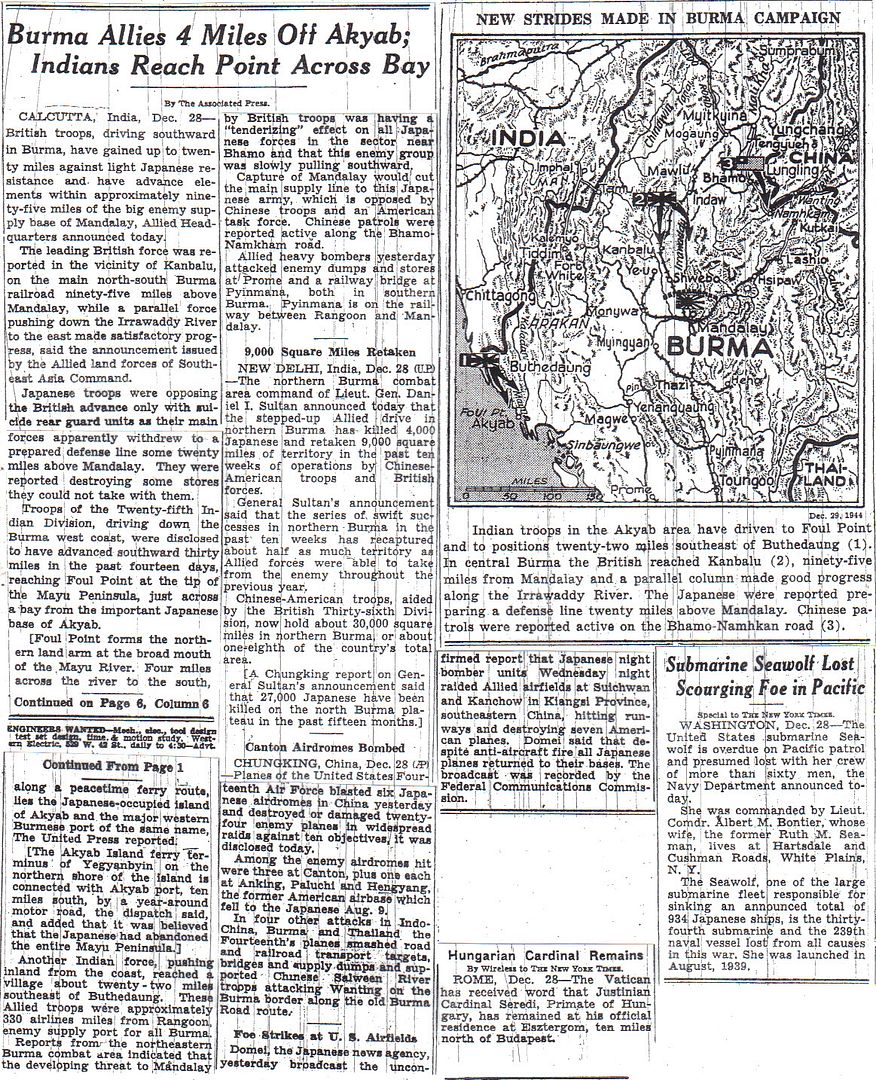
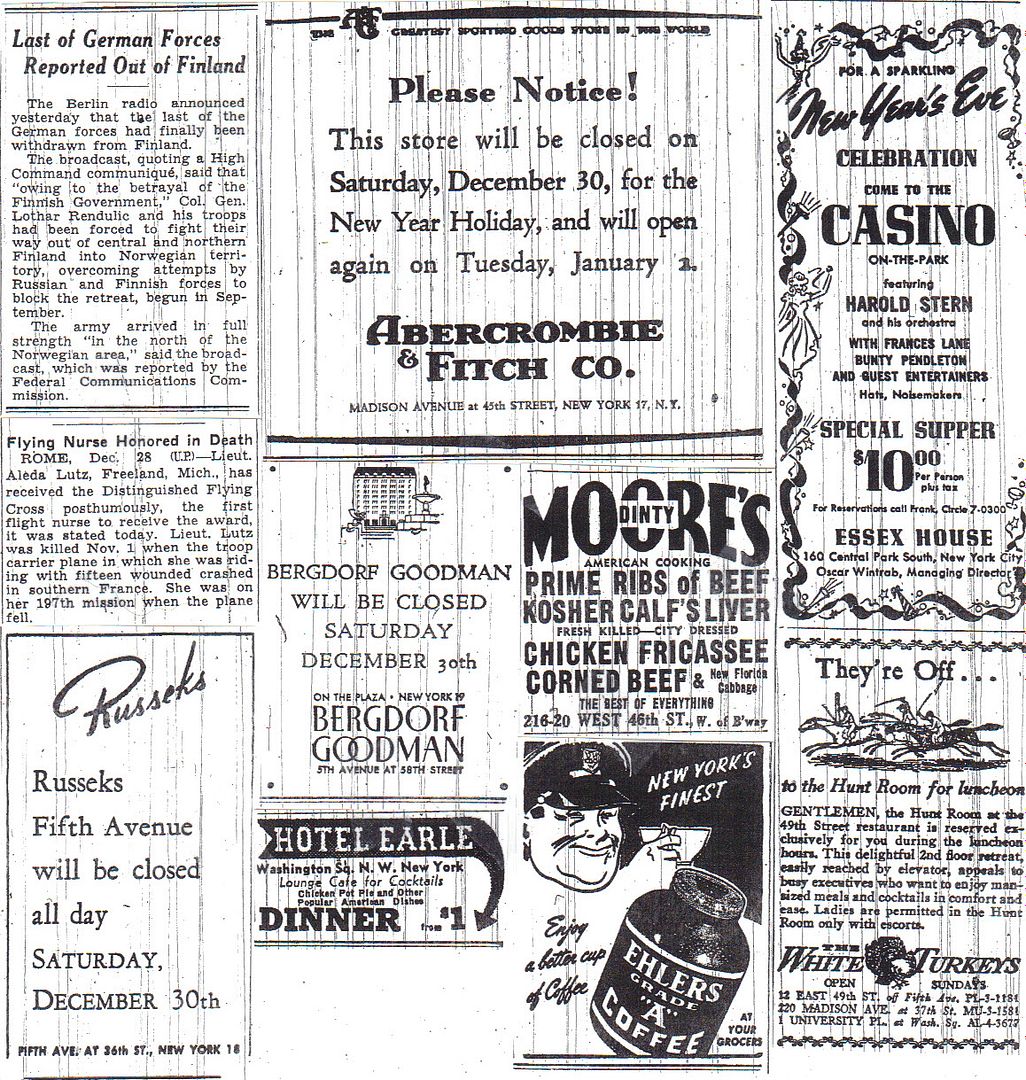
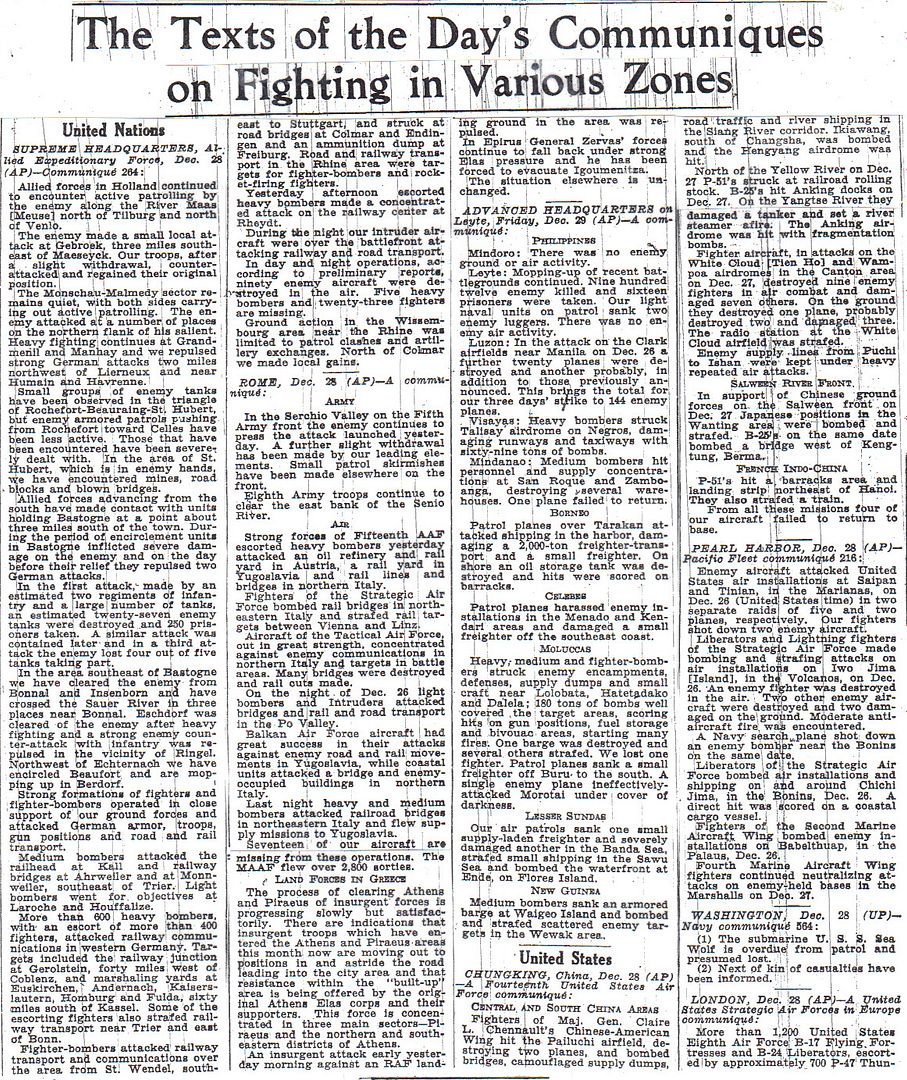
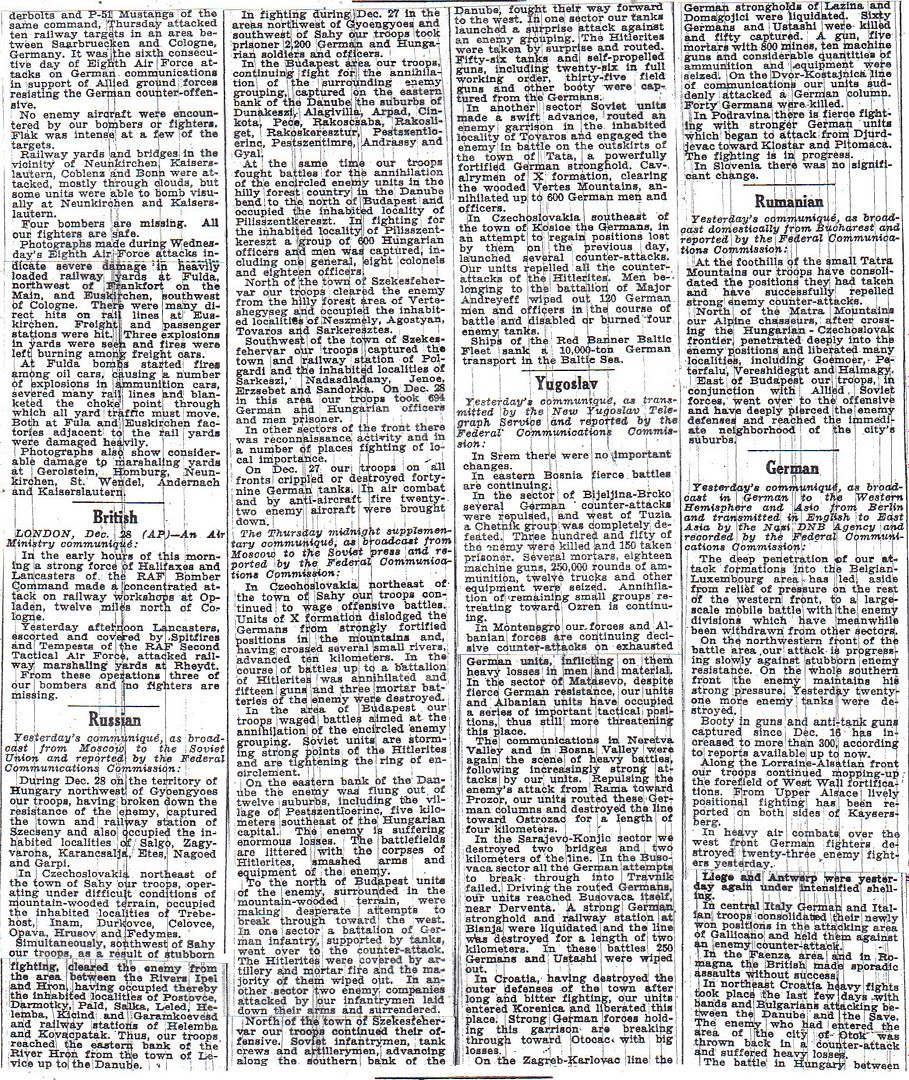
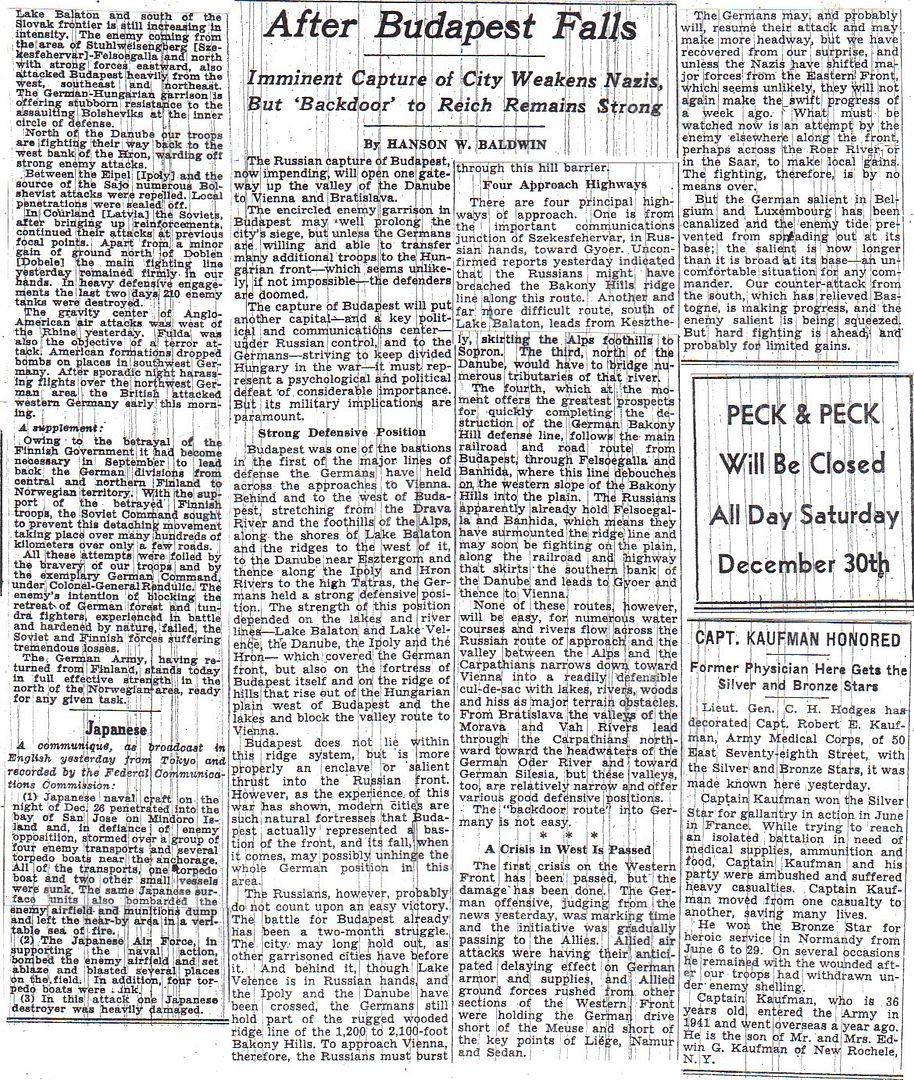
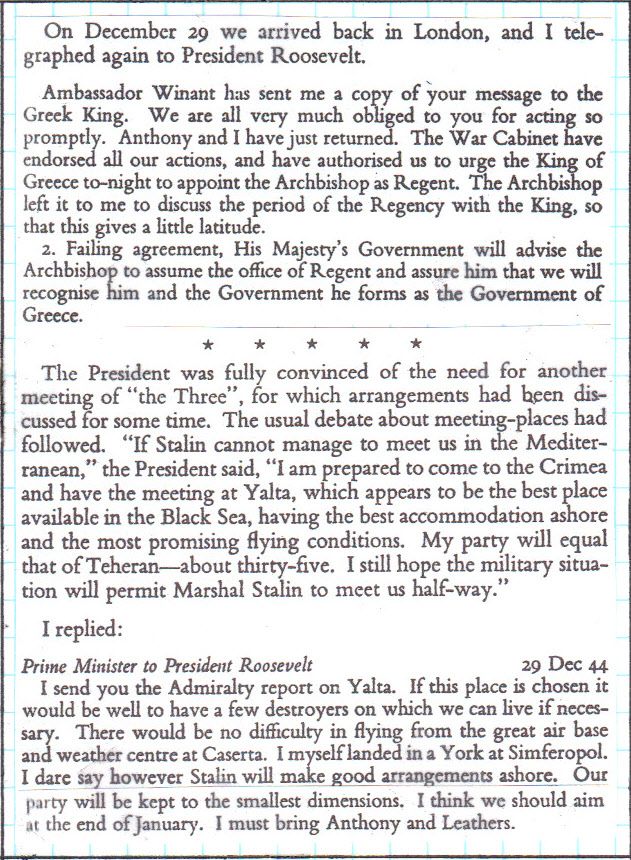
Winston S. Churchill, Triumph and Tragedy
http://www.etherit.co.uk/month/11/29.htm
December 29th, 1944 (FRIDAY)
UNITED KINGDOM: USAAF 78th Fighter Group flies its first mission equipped with the Republic P-51K Mustang.
British General Henry Maitland Wilson, Supreme Allied Commander in the Mediterranean, is promoted to the rank of Field Marshal.
WESTERN EUROPE: Weather causes the recall of over 100 USAAF Ninth Air Force bombers except for seven which bomb the Saint-Vith, Belgium, communications centre and the Keuchingen, Germany road bridge. The XIX Tactical Air Command flies armed reconnaissance over Belgium and Germany and supports the U.S. III, VIII, and XII Corps in the Neufchateau-Bastogne-Arlon areas of Belgium. .
BELGIUM: After yesterday’s meeting at Hasselt Montgomery believed that Eisenhower had come to see his - Montgomery’s - point of view with respect to command and strategy. He writes a letter to Eisenhower that if not insubordinate, was at least insolent and arrogant. Because of Eisenhower’s failure to designate an overall commander for a principal Allied thrust north of the Ardennes, he inferred, they had already had “one very definite failure,” so that the time had come for Eisenhower “to be very firm on the subject . . . no loosely worded statement” would do. He proceeded even to write Eisenhower’s directive for him: “From now onwards full operational direction, control, and co-ordination . . . is vested in the C. in C. 21 Army Group, subject to such instructions as may be issued by the Supreme Commander from time to time.” he tells Eisenhower if his concepts are not followed he is certain that, “we shall fail again.”
This is too much for Ike and he decides to put the matter to the Combined Chiefs of Staff in Washington; either himself or Montgomery. Freddie de Guingand hears of Ike’s intention and asks Bedell Smith, Ike’s chief of staff, to delay the transmission of the message to the Combined Chiefs until he can come to Ike’s headquarters at Versailles. De Guingand is well thought of at Supreme Headquarters and so Smith agrees to the delay. (Jay Stone)
A German A4 (V2) rocket impacts Antwerp at 1625 hours, crashing behind the post office in the Groenstraat; 39 people are killed, 108 badly wounded and 58 houses destroyed.
In the U.S. First Army area, the V Corps front is quiet, with both sides on the defensive. The XVIII Corps (Airborne) zone is also virtually static. The VII Corps mops up infiltrators and patrols. The 83d Infantry Division attacks toward Rochefort with the 329th Infantry Regiment, making slow progress.
In the U.S. Third Army area, the VIII Corps prepares for a drive on Houffalize. The 11th Armored Division moves to the vicinity of Neufchateau. In the III Corps area, Combat Command A of the 4th Armored Division opens the Anon- Bastogne highway. The 35th Infantry Division is clearing the Villers-laBonne-Eau-Lutrebois region; advance elements make contact with the 101st Airborne Division forces at Marvie, southeast of Bastogne.
LUXEMBOURG: The Luxembourg American Cemetery is established at Hamm. This is the final resting place for 5,076 Americans killed in the Battle of the Bulge. “
Among those to be buried there is First Lieutenant Francis Canham who was killed in action while directing fires of the 321st Glider Field Artillery on elements of the 2nd Panzer Division. He remains there today. (Jay Stone)
The 26th Infantry Division continues toward Wiltz against increasing resistance.
During USAAF Eighth Air Force’s Mission 769, 13 aircraft bomb targets of opportunity at Wiltz and one hits Viandan.
NETHERLANDS: During the day, RAF Bomber Command dispatches 16 Lancasters to attack the E-boat pens at Rotterdam; all bomb the target scoring several hits.
GERMANY: RCAF Flight Lt. Dick Audet destroys five German planes in ten minutes. (Patrick Holscher)
The USAAF Eighth Air Force flies Mission 769: 827 bombers and 724 fighters hit communications targets in western Germany; four bombers and three fighters are lost. The targets are (numbers in parenthesis indicate number of aircraft bombing and number lost, e.g., 97-1):
- Communications centres: Lunebach (35-0), Stadtkyell (32-0), Zulpich (31-0), Wittlich (26-0), Feusdorf (19-0), and Prum (5-1).
- Highway choke points at Schleiden (10-0) and Heimbach (9-0).
- Marshalling yards: Bingen (146-1), Frankfurt-am-Main (137-0), Aschaffenburg (68-1), Gerolstein (26-0) and Mosel M/Y at Koblenz (13-0).
- Railroad bridges: Bullay (73-0), Neuweid (54-0) and Ludendorf at Remagen (31-0).
- 33 other aircraft hit targets of opportunity.
USAAF Fifteenth Air Force B-24 Liberators bomb four marshalling yards (M/Y): 44 bomb the M/Y at Landshut, 28 at Rosenheim, 25 at Passau and 24 bomb the Main M/Y at Salzburg while 14 P-38 Lightnings bomb road a bridge south of Rosenheim.
During the day, RAF Bomber Command sends two separate forces to bomb marshalling yards in Koblenz, one of the main centres serving the Ardennes battlefront. One hundred ninety aircraft, 162 Halifaxes, 22 Lancasters and eight Mosquitos, are sent to bomb the Mosel M/Y near the main city; 180 bomb the target. Eighty five Lancasters are sent to hit the Lützel yards north of the city; 82 bomb the target. No aircraft are lost from either operation. At least part of the bombing of each raid hit the railway areas. The Lutzel railway bridge at Koblenz is out of action for the rest of the war and the cranes of the Mosel Harbour are also put out of action.
During the night of 29/30 December, RAF Bomber Command sends 346 aircraft, 324 Lancasters and 22 Mosquitos, to bomb the Buer synthetic oil refinery at Gelsenkirchen; 323 bomb the target with the loss of four Lancasters. The raid takes place in difficult conditions. There is thick cloud over the target but Oboe skymarkers are accurately placed and the refinery is badly hit. The local report says that 300 high-explosive bombs fell within the oil-plant area. There are two large and ten small fires and much damage to piping and storage tanks. In a second raid, 197 aircraft, 159 Halifaxes, 24 Lancasters and 14 Mosquitos, are sent to bomb the marshalling yards at Troisdorf; 176 bomb but most of the attack misses the target. In a third mission, nine Canadian bombers lay mines in the Elbe River.
Canadian Flight Lieutenant (USAAF Captain) Richard “Dick” Audet of RCAF No. 411 (Fighter) Squadron based at Heesch, the Netherlands, shoots down two Bf-109’s and three Fw-190 in a single mission in the Rheine area. Even more amazing is his canopy came off halfway through the attacks. He is flying a Vickers Supermarine Spitfire LF MK.IXe, RAF serial number RR201. He is the only Spitfire pilot ever to score five victories in one sortie.
U-3518 commissioned
U-2360 launched.
AUSTRIA: Seventy USAAF Fifteenth Air Force heavy bombers bomb the West marshalling yard at Innsbruck; nine other aircraft bomb targets of opportunity.
HUNGARY: Russian emissaries sent to the garrison in Budapest to negotiate surrender terms are killed by German troops and fighting breaks out. Soviet tanks meanwhile, roll into Budapest.
YUGOSLAVIA: Twenty five RAF bombers of No. 205 (Heavy Bomber) Group drop supplies to partisans with the loss of one bomber.
U.S.S.R.: Polar Fleet and White Sea Flotilla: ASW trawler MS “T-883”/No. 37 (ex-RT-45 “Dvina”) - is sunk by U-995, SW to cape Svatoi Nos while with convoy KB-37. (Sergey Anisimov and Dave Shirlaw)(69)
NORWAY: During the night of 29/30 December, 11 RAF Bomber Command Mosquitos lay mines in the Oslo Fjord.
ITALY: USAAF Twelfth Air Force medium bombers bomb the Rovereto bridge and Lavis viaduct, attack several bridges in northeastern Italy destroying the centre span of the bridge at Pordenone, and severely damage the bridge at Motta di Livenza. Fighter-bombers concentrate on communications targets in the extreme western end of the battle area, with excellent results on bridges in the Massa Lombarda area and destroy numerous vehicles and several locomotives. During the night of 29/30 December, USAAF Twelfth Air Force A-20 Havocs hit targets of opportunity at numerous northern Italian locations, including Ghedi Airfield, and a train south of Mantua.
USAAF Fifteenth Air Force B-17 Flying Fortresses and B-24 Liberators attack various targets. The targets are (numbers in parenthesis indicate number of aircraft bombing and number lost, e.g., 97-1)::
- Locomotive works: Udine (64-4) and Castel Franco Veneto (55-1).
- Marshalling yards: Porto Nouvo at Verona (47-1) and Porto Vescova at Verona (43-2).
- Railroad and bridges: Brenner Pass (53-8) and Bressanone (26-0).
GREECE: A regency is announced for Greece. Prime Minister Papandreaou will resign when a regent is chosen.
SOMALIA: Mogadishu. Capt Simmon Latutin (b.1916), Somerset Light Infantry, saved two comrades, and tried in vain to save a boy, from a blazing and exploding rocket store. He died of burns next day. (George Cross)
CHINA: USAAF Fourteenth Air Force P-51 Mustangs and P-40s on armed reconnaissance hit various targets of opportunity at Shanhsien and Hei-Shih Kuan and east of Tsingsinghsien.
JAPAN: In the Kurile Islands, three USAAF Eleventh Air Force B-25 Mitchells on a fighter decoy mission abort due to weather; two of them are missing on the return flight. Three B-24 Liberators are dispatched to bomb Kashiwabara on Paramushiru Island and Kataoka on Shimushu Island. Two are forced to return to Shemya Island, Aleutian Islands, when their instruments freeze; the third B-24 bombs Katoaka.
VOLCANO ISLANDS: Twenty six USAAF Seventh Air Force B-24 Liberators, based on Guam, bomb Iwo Jima which is bombed again for a 6-hour period during the night of 29/30 December, by nine B-24 Liberators, flying at varying intervals.
BURMA: The Northern Combat Area Command and British Fourteenth Army fronts are linked as patrols of the British 36th Division establish contact with the Indian 19th Division. On the Arakan front, the Indian XV Corps now holds Rathedaung and Kudaung Island.
Nine USAAF Tenth Air Force B-25 Mitchells bomb troops and supplies at Panma while 15 P-47 Thunderbolts hit the supply area at Twinnge and troop concentration at Wetwun. Four B-25 Mitchells continue armed night reconnaissance over communications facilities.
USAAF Fourteenth Air Force P-51 Mustangs and P-40s on armed reconnaissance attack various targets of opportunity east of Man Pong and north of Mongyu.
FRENCH INDOCHINA: Four USAAF Fourteenth Air Force B-25 Mitchells attack targets of opportunity from Dong Hoa to Lang Son while P-51 Mustangs and P-40s on armed reconnaissance attack Gia Lam Airfield.
PHILIPPINE ISLANDS: In the U.S. Eighth Army’s X Corps area on Leyte, the 1st Cavalry Division reaches the west coast and takes Villaba, north of Tibur. The 32d Infantry Division gains its west coast objectives to the north of the 1st Cavalry Division, the 127th Infantry Regiment taking the heights commanding Antipolo Point and the 128th Infantry Regiment reaching the high ground overlooking Tabango and Campopo Bays. Troops of the 34th Infantry Regiment, 24th Infantry Division, are eliminating small Japanese groups along the coast. In the XXIV Corps area, the 3d Battalion, 305th Infantry Regiment, 77th Infantry Division, after advancing 650 yards (594 meters) along the road to Palompon, is pinned down by the Japanese. The Provisional Mountain Force gets into position for a drive east along the Palompon road.
USAAF Far East Air Forces (FEAF) B-24 Liberators bomb Sasa Airfield on Mindanao Island. FEAF aircraft fly small strikes against a wide range of targets in the central Philippine Islands and southern Luzon Island.
EAST INDIES: USAAF Far East Air Forces (FEAF) B-25 Mitchells and fighter-bombers hit Namlea on Boeroe (Buroe) Island. Fighter-bombers hit northeastern Celebes Island airfields while B-24 Liberators bomb Limboeng on Celebes Island. FEAF aircraft fly small strikes against a wide range of targets in northern Borneo and on Timor Island.
NEW GUINEA: The Australian Piper Force (two battalions of the 2/11th Battalion, 19th Brigade, 6th Division) occupies Musinau, Northeast New Guinea. Musinau is located about 42 miles (68 kilometres) southeast of Aitape.
SOLOMON ISLANDS: On Bougainville, a company of the Australian 15th Battalion, 29th Brigade, 3rd Division, lands south of the Tavera River and the log crossing on the Mendai Track-Peters’ Post and occupy it. Meanwhile, a company of the 47th Battalion, 29th Brigade, advances up the Jaba River and establishes a base about halfway to the junction with the Pagana River. The Australians destroy a Japanese pocket that has been holding up their advance along the Jaba River.
U.S.A.:
Destroyers USS Rowan and Vesole launched.
Minesweeper USS Murrelet launched.
Minesweeper USS Fixity commissioned.
Submarine USS Quillback commissioned.
ATLANTIC OCEAN: SS Arthur Sewall was travelling in the two column convoy TBC-21 as the fourth ship in the port column (listed as station #18), when the convoy was attacked by U-772 seven miles SE of Portland Bill Lighthouse. The two Liberty ships Arthur Sewall and Black Hawk were torpedoed and damaged beyond repair. The Arthur Sewall was struck by one torpedo on the port side in the engine room. The torpedo entered the machinery space and travelled over ten feet before exploding. The blast demolished the engines and the port boilers and created a hole 20 feet long. Five men were burned badly and one officer was killed on watch below. The keel remained as the only structural member holding the ship together. The vessel settled by the stern four feet and remained on even keel. The crew of eight officers, 32 men and 29 armed guards (the ship was armed with one 5in, one 3in and eight 20mm guns) did not abandon ship. One injured fireman died next day. The tug Pilot took the vessel in tow and she arrived at Weymouth nine hours later, where she was declared a total loss. After the war she was towed to Portland, where she was temporarily repaired before she was towed to Bremerhaven. She was loaded with obsolete chemical ammunition, towed to sea and was scuttled in the North Sea on 26 Oct 1946. SS Black Hawk was travelling in the two-column convoy TBC-21 as the last ship in the starboard column, when the convoy was attacked by U-772 seven miles SE of Portland Bill Lighthouse. The Black Hawk was struck by one torpedo two minutes after the Arthur Sewall was hit 500 yards off the bow. The torpedo struck on the port side at the #5 hatch, set off the after magazine, completely destroyed the after section of the ship and shot flames and smoke 150 feet into the air. The engines were immediately secured as the ship sank by the stern. A crack appeared at the #3 hatch and water entered #3 and #4 holds and the engine room until only the forward two compartments kept the ship afloat. 30 minutes after the attack, the seven officers, 34 men and 27 armed guards (the ship was armed with one 5in, one 3in and eight 20mm guns) and one Army security officer began to abandon ship in four boats and two rafts. The men were picked up by corvette HMS Dahlia and landed at Brixham at 2030. Four men were injured and the cook died ashore in a hospital. A salvage crew later boarded the vessel to prepare her to be towed to Warboro Bay, where she was beached an declared a total loss.
From Atkinson’s The Guns at Last Light
And then, with the chronic nescience of a political naïf, he overplayed his hand, again. In a note to Eisenhower on Friday, December 29, Montgomery wrote:
We have had one very definite failure…One commander must have powers to direct and control the operation; you cannot possibly do it by yourself, and so you would have to nominate someone else.
He enclosed a proposal order for Eisenhower to issue to both 12th and 21st Army Groups, decreeing the “from now onwards full operational direction, control, and coordination of these operations in vested in the [commander-in-chief of] 21 Army Group.” In summation, he told the supreme commander, “I put this matter up to you again only because I am so anxious not to have another failure.” However, he added, without “one man directing and controlling…we will win again.”
By chance, Montgomery’s note arrived just before a personal message to Eisenhower from George Marshall, who noted that “certain London papers” were calling for the field marshal to command “all your ground forces.” The chief added:
“Under no circumstances make any concessions of any kind whatsoever. You not only have our complete confidence, but there would be a terrific resentment in this country following such action…Give them hell.”
Precisely who should get hell was ambiguous, but Eisenhower settled on Montgomery. “They are all mad at Monty,” Kay Summersby told her diary on Friday, subsequently adding, “Bedell [Smith] and E. agree that Monty has changed considerably since the day in Italy over a year ago when he said he wanted to join the team.”
Forward Observers. Gotta love ‘em.
Monty’s failure to Caen early bottled up the entire combined forces in Normandy for weeks.
"Bodies of German soldiers lie strewn over the battlefield of Bastogne, Belgium, the site of one of the fiercest confrontations of the Battle of the Bulge.
Reinforced by paratroopers, the Allied forces refused to surrender even though they were encircled and outnumbered.
When the clouds lifted, Allied planes dropped supplies, and Bastogne was relieved the day after Christmas."
26 B-24’s dropped delayed fuse 500 pound bombs on the airfields in the 29th at IWO JIMA.
Any bomb experts here?
Monty’s letter to Ike:
http://www.eisenhower.archives.gov/research/online_documents/ardennes_battle_bulge/033_045.pdf
Ike’s reply to Monty:
http://www.eisenhower.archives.gov/research/online_documents/ardennes_battle_bulge/033_046.pdf
Just ran across this. 32 LIFE magazine photos from the Battle of the Bulge:
LOL Handwritten at the end of Montgomery’s letter to Ike:
“Do not bother to answer this.”
Hilarious.
I’m sure Eisenhower the human being would have answered quite differently that did Eisenhower the SHAEF commanding general, who still needed Montgomery’s assistance. But I’d bet they weren’t such good “friends” after the war.
Notice also he apparently sent a copy to Bradley, and also notice the XX next to Monty’s comment about failure.
Tomorrow, I’ll the letter De Guingand shoved in front of Monty and told him to sign.
That doesn’t happen until tomorrow, 70 years ago.
I’ll post it. Dumb smartphone.
Disclaimer: Opinions posted on Free Republic are those of the individual posters and do not necessarily represent the opinion of Free Republic or its management. All materials posted herein are protected by copyright law and the exemption for fair use of copyrighted works.